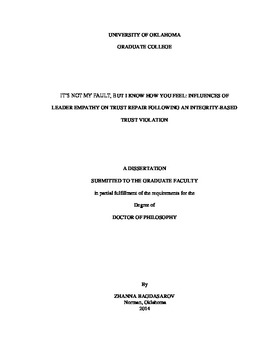| dc.contributor.advisor | Connelly, Shane | |
| dc.contributor.author | Bagdasarov, Zhanna | |
| dc.date.accessioned | 2014-05-07T15:39:00Z | |
| dc.date.available | 2014-05-07T15:39:00Z | |
| dc.date.issued | 2014-05 | |
| dc.identifier.uri | https://hdl.handle.net/11244/10358 | |
| dc.description.abstract | Prior research on trust repair has focused primarily on investigating verbal and substantive responses to breaches of trust. Although consistently implicated in violations, the role of affect in the repair process has been mostly ignored. Using a scenario-based paradigm, we conducted an experimental study to examine the value of leader empathy, specific responses to an integrity-based violation (apology vs. denial), and nature of consequences (personal vs. organizational), as well as their interactive effects, on trust repair. Findings indicated that presence of leader empathy functioned to repair trust better than its absence and, when coupled with a denial of culpability, produced markedly increased perceptions of integrity and overall trust in the leader. These findings contribute to our understanding of how leaders influence followers through expression of emotion, informing both leadership and trust theory. | en_US |
| dc.language | en_US | en_US |
| dc.subject | Psychology, Industrial. | en_US |
| dc.title | It's not my fault, but I know how you feel: Influences of leader empathy on trust repair following an integrity-based trust violation | en_US |
| dc.contributor.committeeMember | Mumford, Michael | |
| dc.contributor.committeeMember | Buckley, Michael | |
| dc.contributor.committeeMember | Snyder, Lori | |
| dc.contributor.committeeMember | Terry, Robert | |
| dc.date.manuscript | 2014-05 | |
| dc.thesis.degree | Ph.D. | en_US |
| ou.group | College of Arts and Sciences::Department of Psychology | |
